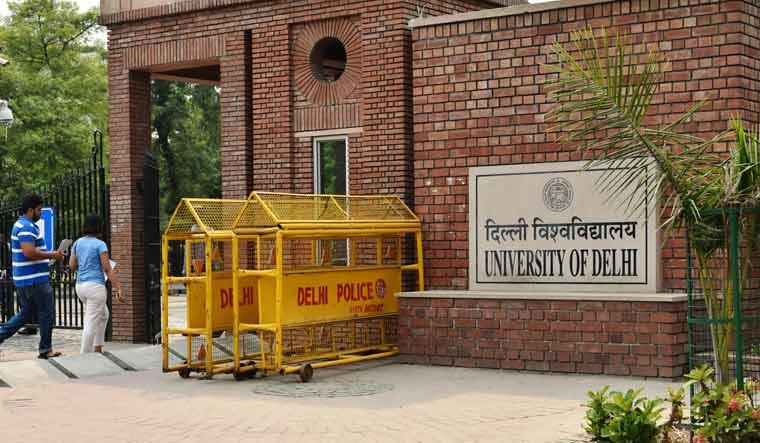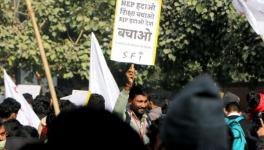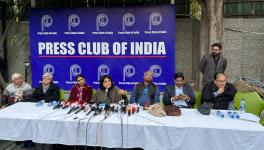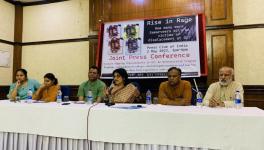Delhi University: Admin and Teachers Lock Horns Over Proposals for EC Meet

Image Courtesy: Sabrang India
The agenda items for the Executive Council meeting of the University of Delhi, scheduled for October 29, has triggered outrage among the serving ad hoc teachers. One of the proposals, if passed, would put a cap on the number of candidates that can be interviewed in university departments and colleges for regular appointments.
The agenda papers submitted that the university would cap the number of candidates at 15 for the first vacancy and ten for every subsequent vacancy in the university departments. For colleges, the number would be restricted to 40 candidates and 20 candidates for every following vacancy.
After much opposition from the Delhi University Teachers' Association (DUTA), the university revised the agenda items. It removed the clause putting a cap on the number of candidates to be interviewed in colleges. It also increased the cap to 30 candidates for the first vacancy and ten candidates for every subsequent vacancy in university departments. However, other provisions for the meeting are also rattling the ad hoc teachers serving in the university for more than a decade. Among the provisions, the university recommended that the teaching experience be given 10% weightage, and 25% weightage be given to the screening of candidates. Similarly, more weightage is attributed to candidates scoring 80% or more marks in under-graduation and post-graduation courses.
The ad hoc teachers in the university were hired as a temporary measure to meet the increasing pressure of students pouring from various corners of the country until the university came up with a comprehensive recruitment programme. The teachers maintained that they were subjected to inhuman working conditions by denying maternity, sick, and study leave. However, the university hardly progressed with the recruitment.
After many failed attempts, a consensus now revolves around absorption through legislation in the parliament, for which the teaching community is heading for a general strike on October 28. The teachers maintain that the agenda items also breach the record of the discussion held between the Vice-Chancellor, Ministry of Education and University Grants Commission officials on December 5, 2019. It was stated, "Provided that the faculty appointed and working on ad hoc/temporary/contract basis and meeting the eligibility criteria shall be shortlisted for interview in the respective university and/or its colleges."
Jitendra Meena, who teaches in Shyam Lal College, told NewsClick that the ad hoc teachers have less confidence in the provisions as they ensure their ouster from the university, disregarding their rich teaching experience.
"The teachers currently serving in the university graduated in a period when the university boards across the country did not allocate such high marks. It's a very recent phenomenon. Our teachers already came through a rigorous process, facing interviews multiple times. Our university experience suggests that the move is intended to oust the serving ad hoc teachers and accommodate the political cadre. What will happen to the families of 4500 odd teachers who gave their best to the university in the last decade," Meena said.
To the question of not inviting candidates from Scheduled Castes/ Scheduled Tribes background below 50% marks, Meena said, "We already see a less percentage of people from marginalised communities coming to the universities because they have fewer resources to spend on studies. As I mentioned earlier, the universities did not allocate higher marks in previous decades. However, the candidates taught at the colleges because they went through multiple interviews at various stages, suggesting they did not lack acumen or skill sets. So, depriving these candidates of interviews because their universities chose to allocate lesser marks would be a blow to social justice."
Rajiv Ray, President, DUTA, wrote a letter to Vice-Chancellor Yogesh Singh and flagged issues about anomalies and irregularities. Ray said that the screening criteria gives poor recognition to teaching experience and disproportionate weightage to PhD candidates by giving only 10 points to teaching experience.
"In devaluing this experience and preventing these candidates from even being called to an interview, the screening criteria deprives the university of the rich experience and skillsets earned by our ad hoc colleagues. The screening criteria awards 25℅ weightage to PhD degrees: a disproportionate sum that will exclude all candidates without PhDs. This will be particularly discriminatory in disciplines like English, Economics, Commerce, History and Mathematics, where PhDs are difficult to attain early in career. The high weightage also does not take into account the disparity in quality of PhDs done at various universities but will privilege candidates from other places over the incumbents in DU," Ray said.
Pointing to the demanding experience of getting a PhD degree in specific humanities streams, Ray added, "The screening criteria awards higher marks to those with scores of 80% and above in PG and UG, which leads to teachers from disciplines like Languages, Humanities and Social Sciences losing scores. High scores like these are also not awarded universally across Indian universities (including by DU), particularly to students who graduated in previous decades (some of who are incumbent/serving ad hoc teachers in DU), causing another layer of problems through the criteria's homogenising approach. Such teachers, despite their track record in academic and professional work, will not even be called for the interview."
Get the latest reports & analysis with people's perspective on Protests, movements & deep analytical videos, discussions of the current affairs in your Telegram app. Subscribe to NewsClick's Telegram channel & get Real-Time updates on stories, as they get published on our website.
























